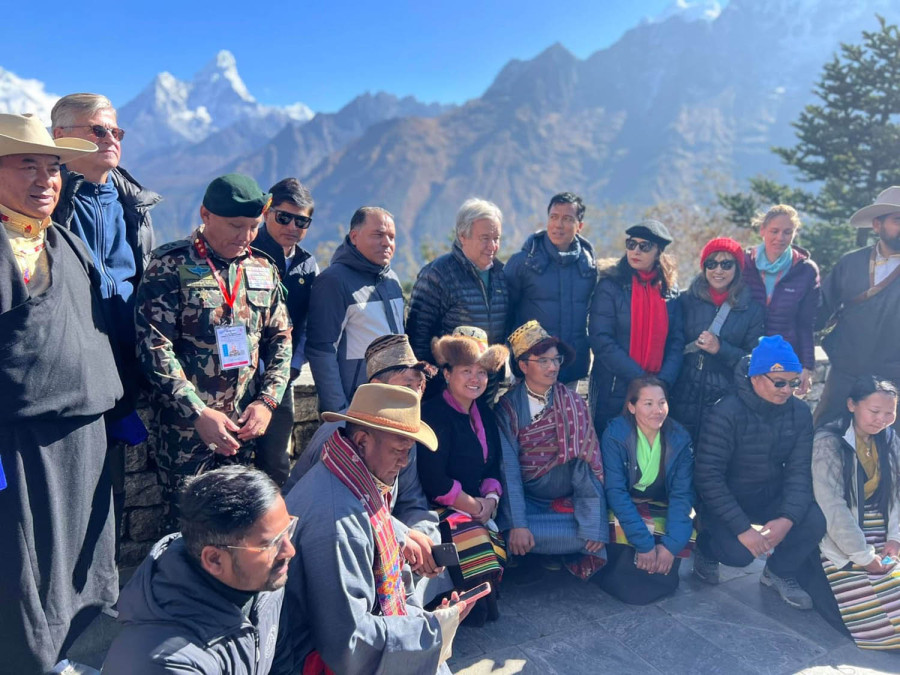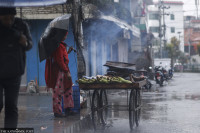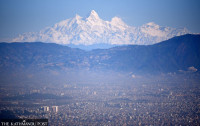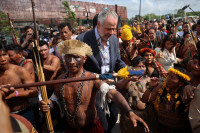Climate & Environment
Guterres issues urgent plea on climate: Stop this madness
Pledges to present the concerns of affected Nepali communities at next month’s UN climate conference.
Anil Giri
As the 2023 UN climate conference is all set to kick off in the United Arab Emirates on November 30, the United Nations Secretary General António Guterres has called on the global community to “stop this madness” after witnessing the wide-ranging impact of climate change from the Everest region on Monday.
Guterres, who arrived in Kathmandu on Sunday midnight on a four-day official visit, reached the Everest region on Monday morning to see firsthand the consequences of the climate crisis in the Himalayas and its impact on livelihoods.
He spoke to locals of ward 4 of the Khumbu Pasang Lhamu Rural Municipality in Solukhumbu district to understand how climate change has impacted their livelihoods and learn more about the multi-faceted impacts of climate change on their daily life. He was joined by senior officials from the UN and Nepal government.
According to Laxman Adhikari, the chairman of ward 4 of Khumbu Pasang Lhamu Rural Municipality, Guterres has committed to present the concerns of locals to the global community at COP-28 along with their feedback and suggestions. After interacting with the local residents of the Everest region, Guterres released a video message in which he urged the world to put an end to the environmental devastation unfolding in the Himalayas.
“I am here in the Himalayas where glaciers are melting at a record level. Like in Greenland, like in Antarctica, sea levels are rising. And here we see floods. We see landslides. We see communities being dramatically impacted. We must stop this madness… Glaciers are retreating, we cannot retreat. We must move forward with climate action,” he said in the video message posted on X.
While rich nations are major contributors to carbon emissions, it is sad that the people living in the remote areas of Khumbu Pasang Lhamu Rural Municipality bear the brunt of the adverse impacts of climate change, Adhikari said, quoting the UN chief.
During the meeting with the locals, Guterres said that the UN and relevant stakeholders are committed to taking action arising from climate change and will try to spread the message across the world.
The crisis is gaining speed, said Guterres, adding “Nepal’s glaciers melted 65 percent faster in the last decade than they had in the previous one.”
“That means phase two of this tragedy looms ever larger—the disappearance of glaciers altogether. Glaciers are icy reservoirs—the ones here in the Himalayas supply fresh water to well over a billion people. When they shrink, so do river flows.”
During the interaction, the locals told the UN chief that sources of water are vanishing, crops are being affected and cases of landslides in the Himalayas are increasing in the rainy season, according to Adhikari.
The locals told Guterres about an energy crisis in the village and requested his support for micro hydropower projects. “I am in Nepal to send a message to the world: The rooftops of the world are caving in,” he said in the message, which was also published on the UN’s official website.
He reached Pokhara on Monday after visiting the Everest region and is scheduled to visit Annapurna Base Camp on Tuesday morning to see similar impacts in the Annapurna region, including the melting of ice and the consequences on the livelihoods of the people living in all geographical locations.
On Sunday, the UN chief met President Ram Chandra Poudel, Prime Minister Pushpa Kamal Dahal, Speaker Devraj Ghimire and leaders of the major political parties and discussed Nepal’s protracted transitional justice system and the unresolved process. They also discussed the ongoing conflict in West Asia.
He assured that the United Nations is prepared to support the conclusion of the peace process, while stressing that it should adhere to international standards and rulings of the Supreme Court, as well as address the concerns of conflict victims.
In 2006, the then Seven-party Alliance and the CPN (Maoist) had signed a comprehensive peace accord pledging to complete the peace process, including the integration of the Maoist arms and combatants within six months. The integration of the Maoist combatants in the Nepal Army was successfully concluded and arms being used by then Maoist fighters were surrendered. But a major component of the peace process, transitional justice, remains incomplete.
A bill related to transitional justice is currently under the Parliament’s consideration. Thousands of victims who suffered during the decade-long insurgency say the bill does not address their grievances.
After completing his visits to Pokhara and Annapurna Base Camp, the UN chief will travel to Lumbini on Tuesday, where he will call for global peace, a senior official at the Ministry of Foreign Affairs said. “Each of his visits, be it to Kathmandu or Everest region or Annapurna Base Camp or Lumbini, they carry distinct and different messages,” the official said.
In the future, major Himalayan rivers like the Indus, the Ganga and the Brahmaputra could have massively reduced flows, said Guterres in his message, adding, “combined with saltwater intrusion, which in turn would decimate deltas.”
“We must act now to protect people on the frontline…and to limit global temperature rise to 1.5 degrees, to avert the worst of climate chaos. The world can’t wait,” said Guterres in his message.




 18.12°C Kathmandu
18.12°C Kathmandu











